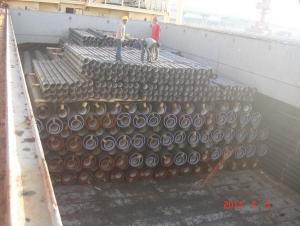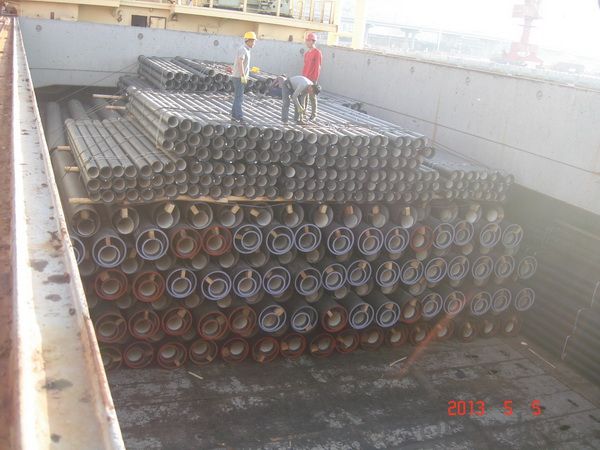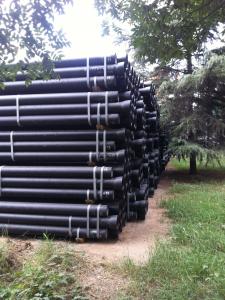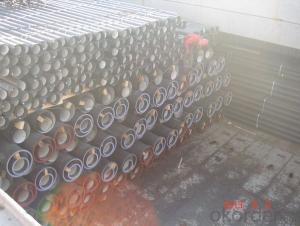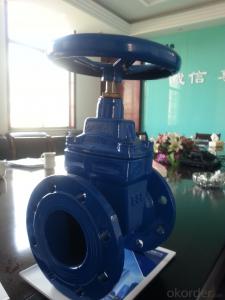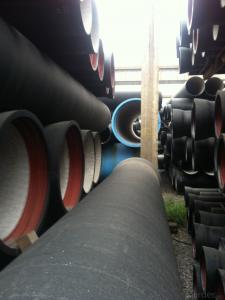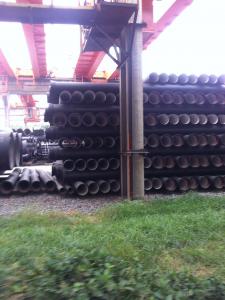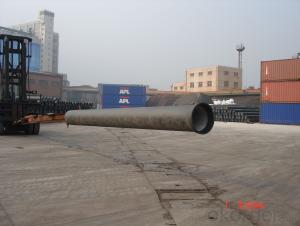DUCTILE IRON PIPES AND PIPE FITTINGS K8 CLASS DN100
- Loading Port:
- Tianjin
- Payment Terms:
- TT OR LC
- Min Order Qty:
- 22 pc
- Supply Capability:
- 3000 pc/month
OKorder Service Pledge
OKorder Financial Service
You Might Also Like
Material : Ductile Cast Iron
Size Range : DN 80mm to DN 2000mm
Unit Effective Length : 6m or 5.7m
Manufacture Standard: ISO 2531:1998/ EN 545:2006/EN 598:2007
Annual capacity : 200,000 tons
Coating Exterior: Zinc 130g/m2 according to ISO 8179-1 and bitumen coating 70 microns.
Cement Interior: Portland Cement/ High Alumina Cement/ Sulphate Resisting Cement Lining according to ISO 4179
Special requirements on external coating and internal lining can be applied
We also provide accessories such as SBR/EPDM rubber gaskets, lubricant paste, pipe caps, PE sleeves, etc.
Additional Parts:
Each pipe is strictly inspected according to related standard to ensure permanently high performance.
Easy Installation at site and service free for life
Long Service Lifespan
Quotation will arrive you within 24hours once we get your inquiry.
We guarantee offering you a competitive price.
A copy of original inspection reports of pipes will be offered after shipment.
Photos of loading process will be sent to the customer after shipment effect.
We will follow-up the delivery progress after shipment effect and update to the customer on weekly basis.
- Q: What is the cost of ductile iron pipes compared to other materials?
- The cost of ductile iron pipes compared to other materials can vary depending on several factors such as the size, length, and application of the pipes. In general, ductile iron pipes tend to be more expensive than other materials such as PVC or HDPE (high-density polyethylene) pipes. This is primarily due to the superior strength, durability, and longevity offered by ductile iron pipes. While the initial cost of ductile iron pipes may be higher, they often provide a more cost-effective solution in the long run due to their extended lifespan. Ductile iron pipes have a life expectancy of over 100 years, making them a highly reliable and low-maintenance choice for water, sewage, and gas distribution systems. This longevity reduces the need for frequent replacements, repairs, and associated costs. Furthermore, ductile iron pipes are known for their exceptional resistance to external loads, pressure, and corrosion. This makes them well-suited for a wide range of applications, including high-pressure water and gas transmission, industrial pipelines, and sewer systems. The inherent strength of ductile iron pipes allows for thinner walls, resulting in reduced material and installation costs when compared to other materials. It is important to note that the cost of ductile iron pipes can also be influenced by market conditions, transportation costs, and availability of raw materials. Therefore, it is always advisable to consult with suppliers and conduct a cost-benefit analysis before making a decision.
- Q: Are ductile iron pipes suitable for pressure reducing valve stations?
- Yes, ductile iron pipes are suitable for pressure reducing valve stations. Ductile iron pipes are known for their strength and durability, which makes them an ideal choice for applications involving high pressure. Pressure reducing valve stations are designed to regulate and reduce the pressure of a fluid or gas in a pipeline system. Ductile iron pipes can handle the pressure exerted by the fluid or gas, ensuring a reliable and efficient operation of the pressure reducing valve station. Additionally, ductile iron pipes have excellent resistance to corrosion, which is crucial in maintaining the integrity of the pipeline system and preventing leaks or failures. Overall, ductile iron pipes provide the necessary strength, durability, and corrosion resistance required for pressure reducing valve stations.
- Q: Are ductile iron pipes suitable for irrigation systems in agricultural fields?
- Yes, ductile iron pipes are suitable for irrigation systems in agricultural fields. Ductile iron pipes have excellent strength, durability, and corrosion resistance, making them ideal for carrying water in irrigation systems. They can withstand high pressure and heavy loads, ensuring reliable water supply to agricultural fields for irrigation purposes.
- Q: Can ductile iron pipes be used for water tunnel crossings?
- Indeed, water tunnel crossings can utilize ductile iron pipes. Renowned for their robustness, longevity, and immunity to corrosion, ductile iron pipes prove to be an ideal option for diverse purposes, including water tunnel crossings. Their ability to endure immense pressure, external burdens, and soil movements, commonly experienced in tunnel crossings, is commendable. Moreover, ductile iron pipes boast an extended lifespan and necessitate minimal upkeep, rendering them an economical resolution for water tunnel crossings.
- Q: How do ductile iron pipes handle water velocity?
- Ductile iron pipes are capable of handling high water velocities due to their inherent strength and durability. The material's flexibility enables it to withstand the force and pressure created by fast-moving water, making it suitable for applications where high water velocity is a concern.
- Q: Are ductile iron pipes suitable for use in desalination plants?
- Ductile iron pipes are indeed suitable for use in desalination plants. Desalination plants are facilities that remove salt and other impurities from seawater, turning it into fresh water for consumption or industrial use. These plants require a reliable and durable piping system to transport the treated water to various destinations. Ductile iron pipes are known for their strength, flexibility, and corrosion resistance, making them an ideal choice for desalination plants. These pipes are made from a form of cast iron that has been treated with magnesium to enhance its properties. This treatment gives ductile iron pipes a high tensile strength, allowing them to withstand the high pressures associated with the desalination process. Additionally, desalination plants often use chemicals and other treatment methods to remove impurities from the water. Ductile iron pipes have excellent resistance to corrosion from these chemicals and can withstand the harsh conditions found in desalination plants without deteriorating over time. This ensures the longevity and reliability of the piping system, minimizing the risk of leaks or failures. Furthermore, ductile iron pipes have a smooth internal surface, which helps to minimize friction and pressure loss as water flows through the pipes. This feature is especially important in desalination plants, where efficiency is crucial for the overall operation of the facility. The smoothness of ductile iron pipes allows for efficient water flow, reducing energy consumption and optimizing the desalination process. In conclusion, ductile iron pipes are suitable for use in desalination plants due to their strength, flexibility, corrosion resistance, and smooth internal surface. These pipes provide a reliable and durable piping system that can withstand the high pressures, harsh chemicals, and demanding conditions found in desalination plants.
- Q: Are ductile iron pipes more resistant to breaks and cracks than other pipe materials?
- Ductile iron pipes generally possess higher resistance to breaks and cracks compared to other pipe materials. Ductile iron, a form of cast iron treated with magnesium, exhibits increased flexibility and reduced brittleness. This enhanced flexibility empowers ductile iron pipes to endure significant pressure and external loads without incurring damage. In contrast to widely-used pipe materials such as PVC, HDPE, or steel, ductile iron pipes excel in strength and durability. They boast higher tensile strength, enabling them to withstand greater forces and pressures without succumbing to failure. Additionally, ductile iron pipes demonstrate superior impact resistance, reducing the likelihood of cracking or breaking when subjected to sudden impacts or external loads. Another advantage of ductile iron pipes lies in their ability to resist corrosion. The material naturally repels rust and remains unaffected by harsh environmental conditions, making it ideal for underground installations or areas with corrosive soils. This corrosion resistance further contributes to the pipes' longevity and overall integrity. Furthermore, ductile iron pipes possess a longer lifespan compared to other pipe materials. They are designed to endure for multiple decades, often exceeding 50 years, with minimal maintenance. This prolonged lifespan decreases the necessity for frequent replacements, resulting in time and cost savings in the long term. However, it is crucial to acknowledge that no material is entirely immune to damage or failure. Proper installation, maintenance, and adherence to industry standards and guidelines are imperative to ensure optimal performance and longevity of ductile iron pipes. Regular inspection and monitoring should also be carried out to identify potential issues or signs of deterioration, facilitating timely repairs or replacements.
- Q: What are the different sizes available for ductile iron pipe?
- Ductile iron pipes come in a wide variety of sizes to meet the needs of different applications in the water and wastewater industry. These pipes typically range in diameter from 3 inches to 64 inches. The most commonly used sizes are 4 inches, 6 inches, 8 inches, 10 inches, 12 inches, 16 inches, 20 inches, 24 inches, 30 inches, and 36 inches. However, larger sizes can also be manufactured for specific project requirements. Having different sizes available allows for flexibility in designing and constructing water distribution systems, sewage networks, and other infrastructure projects. The choice of the appropriate size depends on factors like the volume of flow, pressure requirements, and the distance the pipe needs to cover. It's important to note that the size of a ductile iron pipe refers to its internal diameter, which is also known as the nominal bore. The actual outside diameter of the pipe may vary slightly depending on the manufacturer and the specific dimensions provided. When selecting a size for ductile iron pipes, it's crucial to consider factors such as hydraulic capacity, installation requirements, and compatibility with other pipeline components. Seeking advice from engineers and industry experts is recommended to ensure the correct size is chosen for each particular application.
- Q: How do ductile iron pipes handle water hammer?
- Ductile iron pipes are well-suited to handle water hammer due to their inherent strength and flexibility. The high tensile strength of ductile iron helps absorb and dampen the pressure surges caused by water hammer, preventing any significant damage to the pipes. Additionally, the inherent ductility of these pipes allows them to flex and absorb the impact of water hammer, reducing the likelihood of cracks or bursts. Overall, ductile iron pipes provide a reliable and durable solution for managing water hammer in water distribution systems.
- Q: Are ductile iron pipes compatible with other pipe materials?
- Generally, other pipe materials can be compatible with ductile iron pipes. The high level of flexibility and strength of ductile iron pipes allows for their connection with various materials like PVC, HDPE, and steel. Transition fittings are often utilized to securely and prevent leaks when connecting ductile iron pipes with other materials. To maintain the integrity of the pipeline system and ensure compatibility, it is crucial to follow industry standards and guidelines when joining different pipe materials.
Send your message to us
DUCTILE IRON PIPES AND PIPE FITTINGS K8 CLASS DN100
- Loading Port:
- Tianjin
- Payment Terms:
- TT OR LC
- Min Order Qty:
- 22 pc
- Supply Capability:
- 3000 pc/month
OKorder Service Pledge
OKorder Financial Service
Similar products
Hot products
Hot Searches
Related keywords
